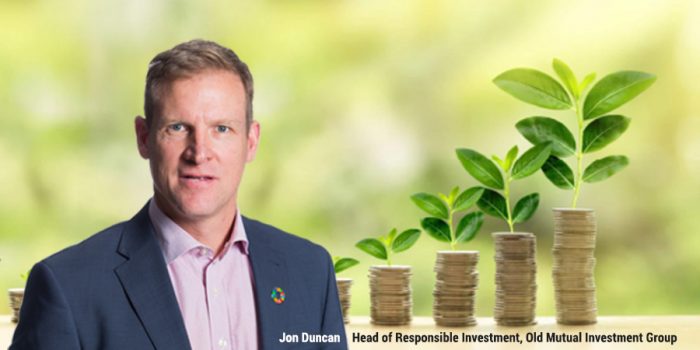Impact Investment To Spearhead A Decade Of Change

We sit down with Jon Duncan, head of Responsible Investment at Old Mutual Investment Group – part of Old Mutual, one of the founding members of the Shared Value Africa Initiative. He talks about opportunities for business in the year ahead and shares his views on linking Shared Value with shareholder value.
YOUR PERSONAL OUTLOOK FOR 2021
Speaking from your perspective as head of responsible investment at Old Mutual Investment Group, what is your personal outlook for business in 2021?
At a high level, 2021 is going to be a tough year. It will be informed by vaccine rollouts and how fiscal stimulus is deployed. I am of the view that businesses with strong green economy credentials will be better placed to succeed in a post-COVID world.
Business, in general, will have to become far more attuned to sustainability-led consumer behavior changes. We see growing consumer preference for goods and services geared to solve long-term green economy outcomes, across sectors such as personal health care, food, energy, water, connectivity, and property to name a few. This also holds true in the financial services sector, where we see increasing flows to ESG-styled exchange trade funds
Business will also need to align to shifts on the global stage as concerns about climate change intensify. In fact, 2021 could be a game changer in this regard. Already, China has made a 2060 net zero commitment, while both the EU and Japan have made 2050 net zero commitments. For the EU, this translates into a short-term 2030 goal of a 55% carbon reduction. All eyes will be on the Biden administration who have renewed commitments to the Paris Accord and will announce carbon reduction targets ahead of COP26.
Climate change and global warming, however, are just two of the many environmental and social impact considerations that will dominate the decade of change that lies ahead of us. The Sustainable Development Goals frame these challenges well and so provides a lens into the Shared Value opportunities set for business.
I believe that 2021 will be an important year for the field of impact investing. I see growing recognition that all capital needs to account for not only risk and return, but also long-term impact. Overall, I expect impact investing to grow beyond foundations, family offices and development finance institutes to include wealth, retail and the institutional markets.
THE OUTLOOK FOR OLD MUTUTAL INVESTMENT GROUP
Has COVID-19 and the events of 2020 prompted any key changes in Old Mutual Investment Group’s go-to-market strategy for the year ahead?
Strategically, Old Mutual Investment Group remains focused on leading the market in the field of responsible investing. The COVID-19 pandemic has accelerated our focus on investment products that generate appropriate risk-adjusted returns, while at the same time also solving for long-term social and environmental resilience. We know there is growing appetite for such products by both retail and institutional clients, who we expect want increased transparency on impact. Consequently, progress in the field of ESG metrics and hybrid metrics will be important for us to keep an eye on, as will, remaining close to emerging sustainability regulations and directives.
At the Old Mutual Group level, the strategic focus on creating value for our customers, society and shareholders remains. Our investment business remains an important enabler of the Groups shared value outcomes, principally because it links the sustainability aspirations of our end clients (policyholders and savers), with the sustainability strategies of the companies we invest in.
YOUR TAKE ON HYBRID METRICS
Following on from the SVAI webinar that you chaired on 3 Dec last year, what is your take on hybrid metrics? Could it be the missing link between Shared Value and shareholder value?
The long-term systemic risk from climate instability, social inequality and general ecosystem decline poses a collective threat that our current economic growth pathway exacerbates. To manage this risk, large asset owners with long liability horizons are starting to transition their portfolio to align with low carbon, resource efficient and socially inclusive outcomes.
For asset allocators and business leaders navigating this transition will require accurate and useful data that provides insight into not only risk and return, but impact as well. Hybrid metrics combine data that is both financially relevant as well as environmentally and/or socially relevant, and so become hugely useful in simultaneously communicating both “shared” and “shareholder” value. At the same time, these kinds of metrics can be seen as serving both a “compliance/accountability/transparency” requirement of the markets while at the same time also serving the “performance” requirements of company management teams and investors.
Hybrid metrics have the potential to address some of the key concerns around the issue of double materiality, which speaks to the fact that risks and opportunities can be material from both a financial and non-financial perspective. Used correctly these metrics can be leveraged by company management to steer strategy and unlock value. Similarly, in the hands of investors these metrics can be used to support capital allocation decisions towards green economy outcomes.
Hybrid metrics could very well be the missing link. However, it is still early days and these innovations should be seen in the broader evolving context of the SASB and IRRC merger, IFRS consultation on sustainability accounting metrics and the EU directives on sustainable fund reporting.




